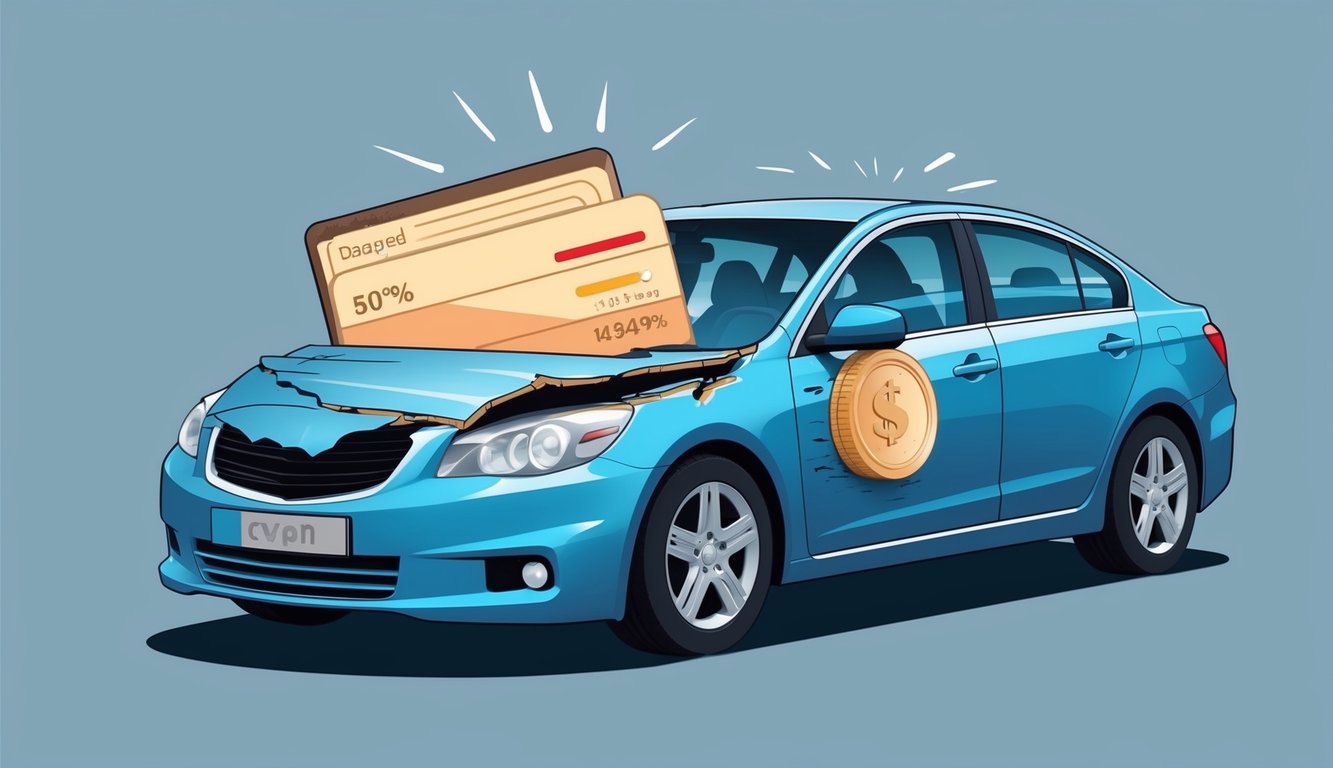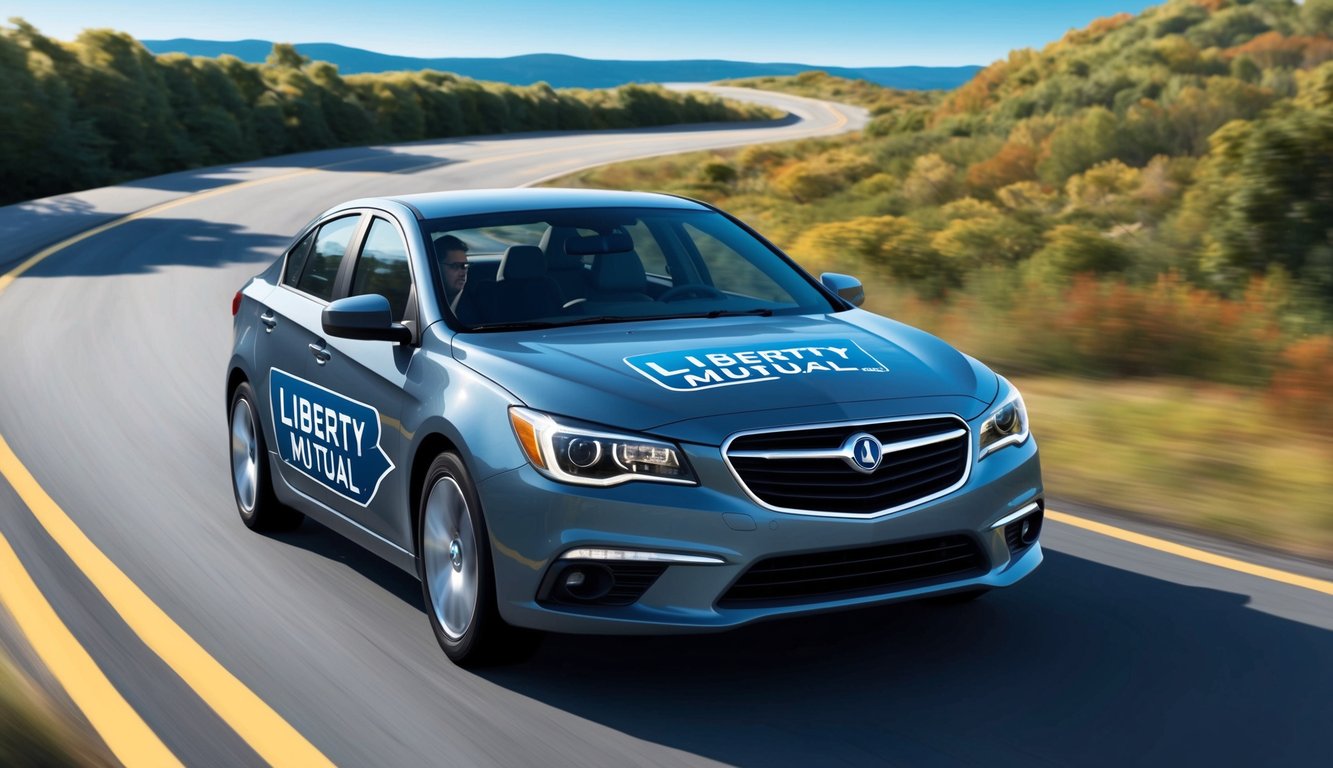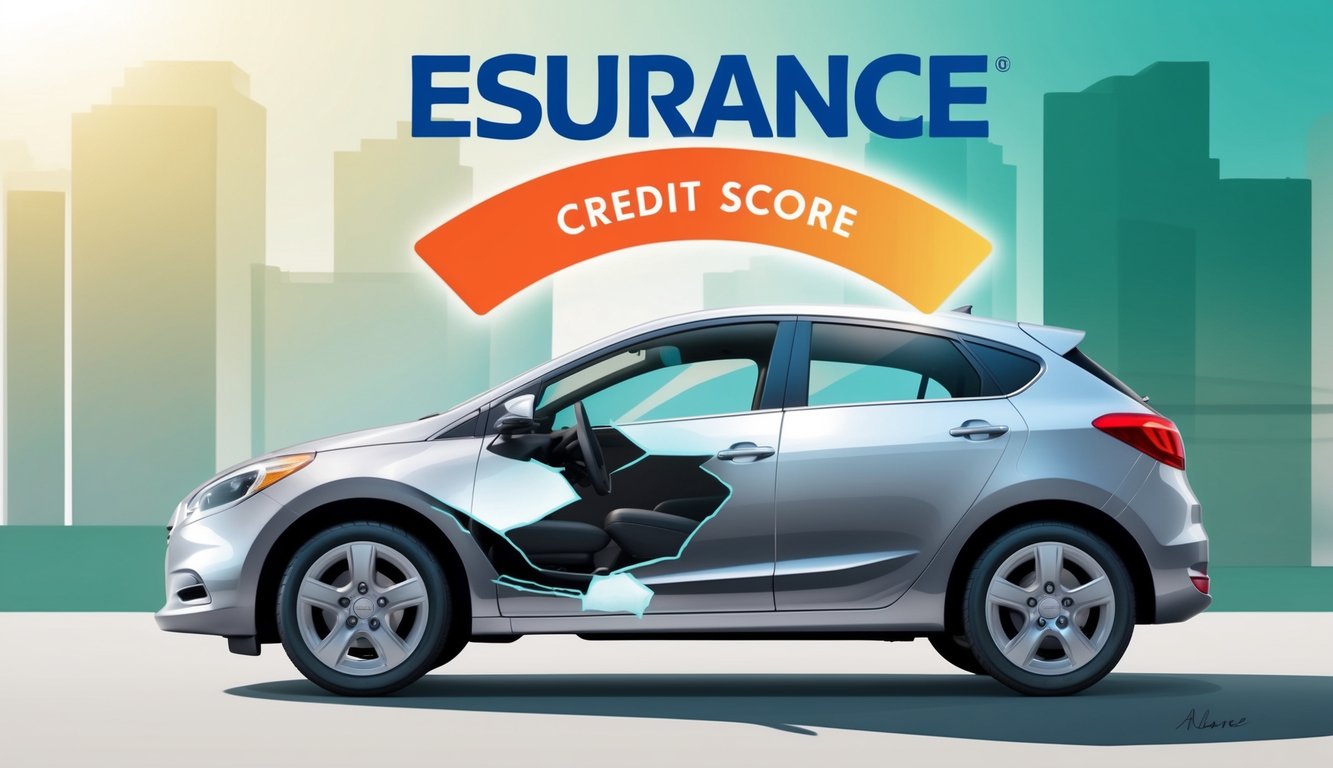Finding affordable auto insurance can be challenging, especially if you have less-than-perfect credit.
Many insurers consider credit scores when determining premiums, which can result in higher rates for those with lower scores.
However, there are still options available for drivers seeking coverage despite their credit history.
Several insurance companies offer competitive rates and specialized policies for individuals with bad credit. These insurers recognize that credit scores don’t always reflect a person’s driving ability or risk level.
By exploring different providers and comparing quotes, you can find coverage that fits your needs and budget, even if your credit isn’t ideal.
1) GEICO
GEICO stands out as a top choice for drivers with bad credit seeking affordable auto insurance.
The company consistently offers some of the lowest rates for those with poor credit scores.
You can expect competitive pricing from GEICO, as they often provide quotes well below the national average for drivers in your situation.
Their rates are typically 40% cheaper than the industry standard for those with bad credit.
GEICO’s safe-driving discount program can help you save even more.
If you maintain a clean driving record, you may be eligible for up to 22% off your premium.
This can significantly offset the impact of your credit score on your insurance costs.
The company’s user-friendly website and mobile app make it easy for you to manage your policy and file claims.
You can quickly get a quote online, adjust your coverage, or contact customer service when needed.
While GEICO’s customer service ratings are average compared to other major insurers, they still provide reliable support.
You can expect prompt assistance when filing claims or addressing policy concerns.
Keep in mind that GEICO’s availability and exact rates may vary depending on your location.
It’s always wise to compare quotes from multiple providers to ensure you’re getting the best deal for your specific circumstances.
2) State Farm

State Farm is a prominent player in the auto insurance market.
Despite its high ratings for customer satisfaction, the company may not be the best choice if you have bad credit.
State Farm’s rates for drivers with poor credit are significantly higher than average. Annual costs for bad credit drivers can reach $7,961, more than double the national average.
You might find State Farm’s coverage options appealing.
The company offers a wide range of policies and generous coverage options.
This can be beneficial if you’re looking for comprehensive protection.
State Farm also provides numerous discounts.
You may qualify for savings based on your driving habits, vehicle safety features, or policy bundling.
These discounts could help offset the higher rates associated with bad credit.
The company’s customer service is highly regarded.
State Farm has earned above-average ratings for customer satisfaction.
This could be valuable if you prioritize responsive and helpful service.
Keep in mind that State Farm’s competitiveness varies by location.
In some states, you might find more affordable options elsewhere.
It’s always wise to compare quotes from multiple insurers to find the best deal for your specific situation.
3) Progressive
Progressive offers competitive rates for drivers with bad credit.
Their average annual premium for those with poor credit is 27% lower than the national average, at $3,191 per year.
You can take advantage of Progressive’s usage-based insurance program, Snapshot.
This program monitors your driving habits and can lead to significant discounts if you demonstrate safe driving behaviors.
Progressive provides a variety of discounts that can help offset higher rates due to bad credit.
These include multi-policy, multi-vehicle, and safe driver discounts.
The company has earned an A+ rating from AM Best, indicating superior financial strength.
This means you can trust Progressive to fulfill its claims obligations.
Progressive’s website and mobile app offer user-friendly tools for policy management and claims filing.
You can easily get quotes, make payments, and access your insurance documents online.
The company has a lower-than-average complaint ratio, suggesting high customer satisfaction.
This means you’re less likely to encounter issues with claims processing or customer service.
Progressive offers unique add-ons like pet injury coverage and custom parts coverage.
These options allow you to tailor your policy to your specific needs.
4) Allstate
Allstate offers auto insurance options for drivers with bad credit.
You may find competitive rates despite your credit challenges.
Allstate provides several discounts that can help lower your premiums.
These include safe driving discounts, multi-policy discounts, and new car discounts.
The company’s Drivewise program uses telematics to monitor your driving habits.
By demonstrating safe driving behaviors, you could earn additional savings on your policy.
Allstate’s usage-based insurance options may benefit you if you don’t drive frequently.
This can potentially reduce your costs compared to traditional policies.
You can easily manage your policy online or through Allstate’s mobile app.
This allows you to make payments, file claims, and access important documents conveniently.
Allstate offers 24/7 claims support, ensuring you can get help when you need it most.
Their extensive network of repair shops can assist you in getting back on the road quickly after an accident.
While Allstate may not always have the lowest rates for drivers with bad credit, their comprehensive coverage options and customer service can provide value.
It’s worth getting a quote to compare with other insurers.
Remember to ask about all available discounts when obtaining a quote from Allstate.
This can help you maximize your savings potential despite credit challenges.
5) Nationwide
Nationwide offers competitive car insurance rates for drivers with bad credit.
Their coverage options are comprehensive, including standard protection and add-ons to suit your needs.
You can benefit from Nationwide’s usage-based or mileage-based insurance programs.
These options may help you save money on your premiums if you’re a safe driver or don’t drive frequently.
Nationwide’s SmartRide program tracks your driving habits and can lead to discounts of up to 40%.
The SmartMiles program is ideal if you don’t drive often, as it bases your rate on the miles you actually drive.
You can also take advantage of Nationwide’s accident forgiveness feature.
This add-on prevents your rates from increasing after your first at-fault accident.
Nationwide offers a variety of discounts that can help offset higher rates due to bad credit.
These include multi-policy, safe driver, and good student discounts.
The company’s mobile app allows you to manage your policy, file claims, and access your digital insurance card easily.
This convenience can be particularly helpful when you’re on the go.
Nationwide’s customer service is known for being responsive and helpful.
You can reach out to them 24/7 for assistance with your policy or claims.
6) Farmers Insurance

Farmers Insurance offers options for drivers with bad credit.
You can find coverage that fits your needs despite credit challenges.
Farmers provides a range of discounts to help lower your premiums.
These include safe driver, multi-policy, and good student discounts.
The company’s usage-based insurance program can help you save money based on your driving habits.
This option rewards safe driving behaviors.
Farmers has a mobile app that allows you to manage your policy and file claims easily.
You can also use it to request roadside assistance when needed.
The insurer offers customizable coverage options.
You can tailor your policy to include add-ons like accident forgiveness or new car replacement coverage.
Farmers has a strong financial stability rating.
This means you can trust their ability to pay out claims when necessary.
Customer service is available 24/7, ensuring you can get help whenever you need it.
You can reach out via phone, email, or through their website.
While Farmers may not always offer the lowest rates for drivers with bad credit, their comprehensive coverage options and discounts may make them worth considering.
7) Liberty Mutual

Liberty Mutual offers auto insurance coverage in all 50 states and Washington, D.C. This widespread availability makes it a viable option for drivers across the country, including those with bad credit.
The company provides various discounts that can help reduce your premiums.
You may qualify for savings based on your driving habits, vehicle features, or policy choices.
Liberty Mutual’s RightTrack program is a usage-based insurance option.
It monitors your driving behavior and can lead to discounts if you demonstrate safe driving habits.
For drivers with bad credit, Liberty Mutual’s rates may be higher than the national average.
However, the company’s numerous discounts can help offset these costs.
Liberty Mutual offers a variety of coverage options to customize your policy.
These include standard coverages like liability, collision, and comprehensive, as well as additional options like new car replacement and accident forgiveness.
The company’s online experience is rated above average.
You can easily manage your policy, file claims, and access customer support through their website and mobile app.
While Liberty Mutual’s rates for drivers with bad credit may not be the lowest, their wide range of coverage options and discounts make them worth considering.
You can request a quote to see how their pricing compares to other insurers for your specific situation.
8) USAA

USAA stands out as a top choice for auto insurance if you have bad credit and qualify for membership.
The company caters exclusively to military members, veterans, and their families.
If you’re eligible, USAA offers competitive rates for drivers with poor credit.
Their average annual premium for full coverage is $2,418, which is significantly lower than many competitors.
USAA’s auto insurance policies come with a range of benefits.
You can expect excellent customer service and a smooth claims process.
The company also offers accident forgiveness and roadside assistance.
To join USAA, you or a family member must have served in the military.
If you meet this criterion, you can take advantage of their affordable rates and comprehensive coverage options.
USAA consistently receives high marks for customer satisfaction.
Their digital tools make it easy to manage your policy and file claims online or through their mobile app.
While USAA’s availability is limited to those with military connections, it’s worth considering if you qualify.
Their combination of competitive pricing and quality service makes them a strong contender for drivers with bad credit.
9) American Family Insurance

American Family Insurance offers competitive rates for drivers with bad credit.
The company ranks well for customer service and claims handling, making it a solid choice if you have a low credit score.
American Family provides full coverage car insurance at an average cost of $1,785 per year.
This price is about 8% lower than the national average, potentially saving you money on your premiums.
You may find American Family particularly appealing if you’re looking for usage-based or mileage-based insurance options.
These programs can help you save even more on your policy by rewarding safe driving habits or low mileage.
If you have very poor credit, American Family could be an excellent choice.
The company often offers lower rates than some competitors for customers with credit scores below 580.
American Family also stands out for its low level of customer complaints.
This suggests you’re likely to have a positive experience when dealing with the company for claims or customer service issues.
Keep in mind that while American Family’s full coverage rates are competitive, their minimum coverage policies may be slightly higher than average.
It’s always wise to compare quotes from multiple insurers to find the best deal for your specific situation.
10) Esurance

Esurance offers auto insurance options for drivers with bad credit.
As an online-focused insurer, they provide a streamlined digital experience for obtaining quotes and managing policies.
Esurance’s identity theft coverage can be beneficial if you’re working to improve your credit.
This add-on pays up to $10,000 to repair your name and credit after identity theft.
You’ll also receive assistance from an ID theft advisor and monthly credit monitoring.
These services can help you keep tabs on your credit as you work to improve your score.
Esurance offers several discounts that may help offset higher rates due to bad credit.
These include safe driver, multi-policy, and pay-in-full discounts.
The company’s DriveSense program uses telematics to monitor your driving habits.
Safe driving can lead to additional savings on your premiums.
Esurance provides 24/7 claims service and a mobile app for policy management.
You can easily file claims, track repairs, and access your insurance ID cards through the app.
While Esurance may not always offer the lowest rates for drivers with bad credit, their digital tools and identity theft protection can provide added value.
Consider getting a quote to compare with other insurers.
Understanding Auto Insurance and Credit Scores
Credit scores play a significant role in determining auto insurance rates.
Insurance companies use this information to assess risk and set premiums.
Maintaining a good credit score can lead to more affordable coverage options.
How Credit Scores Affect Auto Insurance Rates
Your credit score impacts your auto insurance rates more than you might expect.
Insurance companies use credit-based insurance scores to predict the likelihood of you filing a claim.
Higher credit scores often result in lower premiums, while lower scores may lead to higher rates.
Insurance providers view poor credit as a risk factor.
They believe individuals with lower credit scores are more likely to file claims.
This perception leads to increased rates for those with bad credit.
Some states prohibit the use of credit scores in determining insurance rates.
However, in most areas, your credit history remains a crucial factor in pricing policies.
The Importance of Maintaining a Good Credit Score
Keeping a good credit score can save you money on your auto insurance.
A higher score demonstrates financial responsibility, which insurers view favorably.
Improving your credit can lead to significant savings on premiums.
To maintain a good credit score:
- Pay bills on time
- Keep credit card balances low
- Avoid opening unnecessary credit accounts
- Regularly check your credit report for errors
Even small improvements in your credit score can result in lower insurance rates.
Some insurers offer rate reductions for customers who show consistent credit improvement over time.
If you have bad credit, consider shopping around for insurance.
Different companies weigh credit scores differently, so you may find more affordable options by comparing quotes from multiple providers.
Strategies to Get the Best Auto Insurance with Bad Credit
Improving your chances of obtaining affordable auto insurance with poor credit requires exploring specialized programs and maximizing available discounts.
You can take proactive steps to reduce your premiums despite credit challenges.
Consider Usage-Based Insurance Programs
Usage-based insurance programs can help you save money regardless of your credit score.
These programs track your driving habits through a mobile app or device installed in your car.
Safe driving behaviors like maintaining speed limits, smooth braking, and avoiding late-night trips can lead to lower rates.
Nationwide offers usage-based insurance that may benefit drivers with poor credit.
Their SmartRide program provides an initial discount just for signing up and the potential for additional savings based on your driving performance.
You can also look into pay-per-mile insurance if you don’t drive frequently.
This type of coverage bases your premium primarily on the number of miles you drive rather than your credit score.
Look for Discounts and Bundling Options
Insurance companies offer various discounts that can help offset higher rates due to poor credit.
Common discounts include:
- Safe driver discount
- Multi-policy discount (bundling auto with home or renters insurance)
- Good student discount
- Vehicle safety feature discount
- Defensive driving course discount
Geico provides numerous discount opportunities for drivers, including up to 22% off for maintaining a clean driving record.
You can also save by insuring multiple vehicles or bundling your auto policy with other insurance products.
Research different insurers to find the best combination of discounts for your situation.
Some companies may weigh certain factors more heavily than others, potentially resulting in better rates despite your credit score.
Improving Credit Score for Better Rates
Raising your credit score can lead to significant savings on auto insurance premiums.
Taking specific actions and understanding the timeframe for improvements are crucial steps in this process.
Tips for Raising Your Credit Score
Pay your bills on time, every time.
This is the most crucial factor in determining your credit score.
Set up automatic payments or reminders to ensure you never miss a due date.
Reduce your credit utilization ratio.
Aim to use less than 30% of your available credit.
Pay down existing balances and consider requesting credit limit increases.
Keep old credit accounts open.
Length of credit history impacts your score positively.
Don’t close old accounts, even if you’re not using them regularly.
Limit new credit applications.
Each hard inquiry can temporarily lower your score.
Apply for new credit only when necessary.
Check your credit report regularly.
Dispute any errors you find with the credit bureaus.
Inaccuracies can negatively affect your score.
Consider a secured credit card if you’re rebuilding credit.
Use it responsibly to establish a positive payment history.
Timeframe for Credit Score Improvement
Credit score improvements don’t happen overnight.
Be patient and consistent in your efforts.
Small positive changes can occur within a few months.
Significant improvements typically take 6-12 months of consistent positive behavior.
Late payments and collections can impact your score for up to 7 years.
Focus on building positive habits.
Regular on-time payments and responsible credit use will yield long-term benefits.
Check your credit score periodically to track progress.
Many credit card companies and banks offer free credit score monitoring.
As your score improves, shop around for better insurance rates.
You may qualify for lower premiums sooner than you think.






